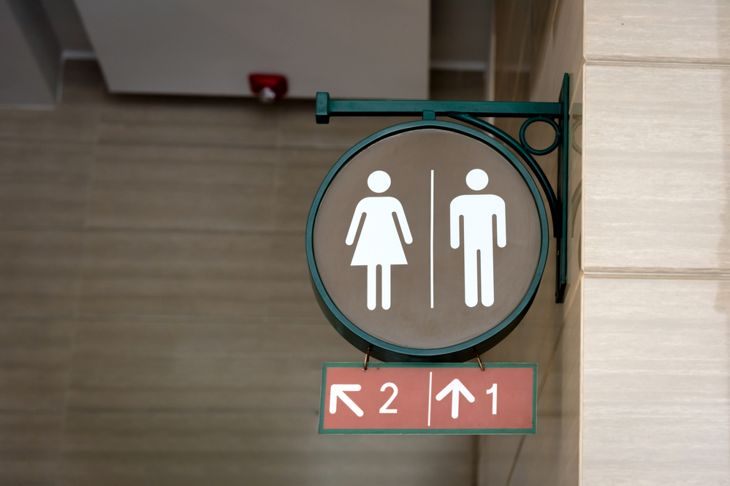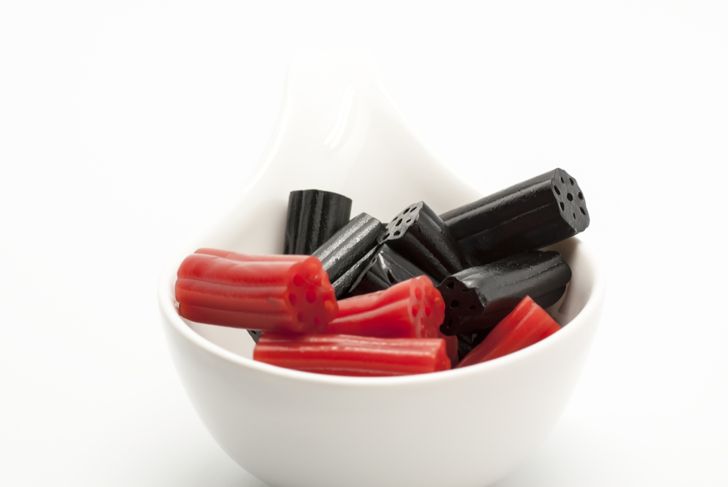Bowel movements can be an awkward subject to discuss, but that doesn’t mean they aren’t important. Bowel movements are actually an excellent indicator of your internal health and can help to diagnose many problems within the digestive tract that might otherwise go unnoticed. While bowel movements may vary based on diet, health, age and other factors, they generally have similar characteristics. If you notice abnormalities, it can be very concerning. With that in mind, it is important to know what each color means and whether you should talk to your doctor about a serious health concern, or simply adjust your diet.
Green
If your bowel movement is green, it may not mean anything unusual at all. This is common, especially if you eat a lot of dark green vegetables like spinach or kale. These iron-rich foods can give things a green hue thanks to their natural coloring, and taking iron supplements can have a similar effect. However, you shouldn’t avoid these healthy foods due to coloring issues. Another common source of green bowel movements is food coloring. If you drink a lot of green-apple or lime-flavored drinks, these may affect coloring. While you may want to cut out sugary green drinks and snacks for other health reasons, the color will not harm you.
Watery Green
If you haven’t had any leafy green vegetables or foods with green dye lately, the explanation for green bowel movements might not be as innocent. If you don’t recall eating any foods that might turn things a different shade, you could be having digestive issues. Bowel movements are typically brown in color because the bile in your digestive tract turns them that shade. Green would indicate that the food didn’t have time to change colors, mean you may have an issue with bile production. Typically, this cause of green bowel movements would also cause them to be watery or runny.
Brown or Dark Brown
Most bowel movements are brown. The exact shade will vary from day to day, based on factors like what you ate and how well you digested your food. Generally, brown or dark brown is an acceptable color. Eating plenty of fiber can help you have regular bowel movements and keep your digestive system in check. Some doctors recommend probiotics, which are sold in varying strains and can help to balance the good and bad bacteria in your gut and maintain healthy digestive processes. In general, if your bowel movements are this shade of brown, your digestive system is working properly.
Yellow
Yellow bowel movements are very common, and are not necessarily bad. In young babies, it can simply be a sign that they are breastfeeding. However, yellow bowel movements that look and smell unpleasant may indicate that your digestive system isn’t properly processing fat. This is especially common in people who have had their gall bladder removed or who have been diagnosed with celiac disease, along with other digestive tract conditions. Undigested fats will appear greasy and will smell badly, which is when it is time to see a doctor. Your physician can help you to adjust your diet to prevent this.
Pale Brown
Some medicines may turn your bowel movements a lighter shade of brown. If this happens, it is not a serious cause. If you notice a consistent change, you can ask your pharmacist whether this is a known side effect of the medication you are on. It commonly occurs with anti-diarrheal medication. However, this change can also be caused by a reduction in bile. The bile may be lacking because it is not being produced properly, or it might be caused by a blockage somewhere along the digestive tract. This can indicate a variety of diseases, including hepatitis and cancer, so be sure to see your doctor if it is not caused by new medication.
Black
Surprisingly, black bowel movements are not always bad. Typically, they are caused by something that is black or dark in color, including licorice, black or blueberries, or food coloring. If you notice black bowel movements, you should try to make a list of the foods you have recently eaten and see if any of them are very dark in color. Iron supplements can also cause this coloring change, so consider what medications you have taken recently as well. Typically, black coloring caused by foods or medications will not result in changes in consistency or appearance, so do not be concerned if it otherwise looks normal.
Tarry Black
Although most black bowel movements are benign, you should be concerned if you noticed black, tar like bowel movements. This indicates that your upper digestive tract may be bleeding. You can tell this because the blood has had time to harden and turn black as it travels through your system. Common causes of this type of bowel movement include cancer, ulcers, and tumors. You may also have bleeding in your esophagus or stomach, likely caused by a condition like acid reflux or repeated vomiting. There is no way to know exactly what the issue is without talking to your physician, so it is important to see a doctor right away to diagnose the cause.
White
Like pale brown bowel movements, white bowel movements indicate that there may not be enough bile in your digestive process. If you have repeated white bowel movements, you should talk to your doctor about the condition. The liver is responsible for bile production, so a lack of it may indicate liver disease. It can also be an issue with your gallbladder, such as gallstones or having had your gallbladder removed in the past. There are other less serious causes, like having been made to take barium prior to an x-ray, but if the problem persists, you should see a physician for a diagnosis.
Red
Most red bowel movements are not a reason to be concerned. Like most other color changes, they are often a result of something you ate. Some of the most common culprits include red sports drinks or fruit punches, red velvet cake, and red gelatin. Even natural foods, like beets, can cause your bowel movement to become reddish in color. If you notice red coloring, you should always try to remember whether there were any items that you ate or drank that might have caused the color change. If so, avoid eating those items temporarily and make sure the problem stops, just to be sure that you have correctly diagnosed the cause.
Bright Red
If you notice bright red bowel movements, there may be a reason to contact your physician. If you cannot identify a food that may have caused the change, you may be bleeding somewhere within your lower intestinal tract. You can tell this because the blood is still red, and has not had time to become black and tarlike. This can be caused by a variety of factors, including cancer, colitis, hemorrhoids, fissures and diverticulitis. You may notice red coloring on the toilet tissue, which can indicate that is caused by bleeding and not red food dye. If this happens to you, you should schedule an appointment with your physician to find out what the exact cause is.

 Home
Home Health
Health Diet & Nutrition
Diet & Nutrition Living Well
Living Well More
More




















